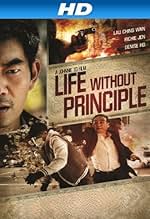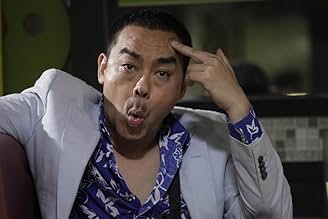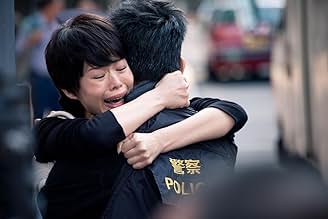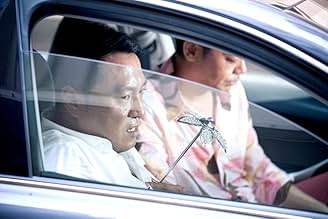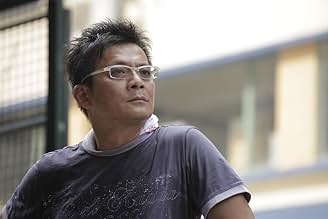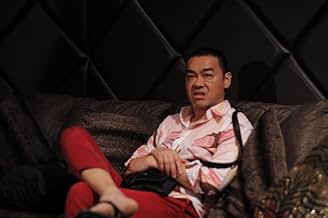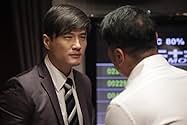AVALIAÇÃO DA IMDb
6,9/10
2,9 mil
SUA AVALIAÇÃO
Neste suspense, o mundo financeiro leva três pessoas desesperadas e muito diferentes umas das outras a arriscarem tudo.Neste suspense, o mundo financeiro leva três pessoas desesperadas e muito diferentes umas das outras a arriscarem tudo.Neste suspense, o mundo financeiro leva três pessoas desesperadas e muito diferentes umas das outras a arriscarem tudo.
- Prêmios
- 17 vitórias e 28 indicações no total
Ching-Wan Lau
- Panther
- (as Ching Wan Lau)
Richie Jen
- Inspector Cheung
- (as Richie Ren)
Eddie Cheung
- Wah
- (as Siu-Fai Cheung)
Siu-Kay Lee
- Brother Four
- (as Siu-Kei Lee)
Avaliações em destaque
Pale color background, 70's and 80's scene set-up, steady frame shot, constant tempo, dramatic directing and acting; the film is full of old day's sentiments, yet it's a story happening in the overwhelmingly prosperous year 2010. Such a misplacement to reflect the most confusing and unbreakable issue that is troubling everyone in the metropolis gives a strong implication of a totally turning upside down era where boundary between right and wrong doesn't exist anymore. Things realigned according to past social order cannot stand the wave of time change; social value, moral standard, principle are all becoming useless and destroyed. No matter how hard one tries to reset it, it's no more than a joke that nobody would pay attention.
As people are turning to a dead end corner, surprises might turn up to help. On the other hand, those who think they can figure out everything not losing a penny might not be as wise as they presume they are, or somehow be ruined by their wisdom. Lo and Keung thought they are the winner of the game; even though they persist until the last breath, their fatal ending wouldn't change. Denise Ho and Lau, playing honest roles ever, should have been the loser of the game, but thanks to an accident, they both live a decent life thereafter without spending an effort. It's not strange or new to see fate or coincidence happening to the characters in Johnny To's film, but being put in a world of misplacement, this time it looks more like an accident than it's under fate, leading to an even more absurd ending where the world is totally unpredictable that one can't reason it. Mankind relies on accident and luck to settle down, that is a laughable grief.
The film, however; doesn't seem to rule out hard work could bring return, at least Wong, the role of recyclable paper collector, has enough significance. Unfortunately just a while later we see an old working class having fallen under the fade-out group of the society trying to kill himself. The script is actually talking to itself debating over the subject. It even further elaborates by condemning through the characters' dialog. The most remarkable one is the confession by JJ Jia in the police station. Her brilliant acting has turned uncontrollably subconscious contradiction within into reasonable greed. What a marvelous demonstration of metropolis ridiculousness!
Sensibility might not win in this battle against absurdity. Richie Ren has been in a terribly confusing state struggling deeply within throughout the entire film. Not to mention the incidents he faces as a police inspector, he has yet to deal with a lot of personal problems such as his wife's persistence to purchase an apartment under the high market price, a seriously sick father and the sudden arrival of a younger sister by the mysterious wife of his father. These, however; are not dramatic enough to constitute irony effect, so the director has to arrange his wife coming to a sudden awakening by seeing him would die as the ending of the story. All these have come together too fast that Richie Ren is unable to react. He acts in such a slow-reflex way that has conveyed his thoughts of questioning "what's going on with my fate?" He rather believes it's all a coincidence. By taking away one's fate, he loses control over his life and all that left to him is coincidence. He has to pray for this for the rest of his life.
Although the script is full of condemns to reality, the director has remained himself as an outsider with a very calm view over what is happening. The shots are all apathetic, just like people ignoring what is happening around them every day. This metaphor is too good, really too good that it might need another accidental coincidence to wake up the audiences before they would even notice it.
As people are turning to a dead end corner, surprises might turn up to help. On the other hand, those who think they can figure out everything not losing a penny might not be as wise as they presume they are, or somehow be ruined by their wisdom. Lo and Keung thought they are the winner of the game; even though they persist until the last breath, their fatal ending wouldn't change. Denise Ho and Lau, playing honest roles ever, should have been the loser of the game, but thanks to an accident, they both live a decent life thereafter without spending an effort. It's not strange or new to see fate or coincidence happening to the characters in Johnny To's film, but being put in a world of misplacement, this time it looks more like an accident than it's under fate, leading to an even more absurd ending where the world is totally unpredictable that one can't reason it. Mankind relies on accident and luck to settle down, that is a laughable grief.
The film, however; doesn't seem to rule out hard work could bring return, at least Wong, the role of recyclable paper collector, has enough significance. Unfortunately just a while later we see an old working class having fallen under the fade-out group of the society trying to kill himself. The script is actually talking to itself debating over the subject. It even further elaborates by condemning through the characters' dialog. The most remarkable one is the confession by JJ Jia in the police station. Her brilliant acting has turned uncontrollably subconscious contradiction within into reasonable greed. What a marvelous demonstration of metropolis ridiculousness!
Sensibility might not win in this battle against absurdity. Richie Ren has been in a terribly confusing state struggling deeply within throughout the entire film. Not to mention the incidents he faces as a police inspector, he has yet to deal with a lot of personal problems such as his wife's persistence to purchase an apartment under the high market price, a seriously sick father and the sudden arrival of a younger sister by the mysterious wife of his father. These, however; are not dramatic enough to constitute irony effect, so the director has to arrange his wife coming to a sudden awakening by seeing him would die as the ending of the story. All these have come together too fast that Richie Ren is unable to react. He acts in such a slow-reflex way that has conveyed his thoughts of questioning "what's going on with my fate?" He rather believes it's all a coincidence. By taking away one's fate, he loses control over his life and all that left to him is coincidence. He has to pray for this for the rest of his life.
Although the script is full of condemns to reality, the director has remained himself as an outsider with a very calm view over what is happening. The shots are all apathetic, just like people ignoring what is happening around them every day. This metaphor is too good, really too good that it might need another accidental coincidence to wake up the audiences before they would even notice it.
10lyx-1
I really don't understand the low ratings for this superb film. This is one of the most brilliant films about the current state of the world as reflected in Hong Kong society I've seen, especially as an indictment against the financial markets and banks, as exemplified in the cold reptilian nature of the female banker. The non-plot is seamlessly woven, though there's a tribute to Kieslowski here, and To coaxed great performances from most of his cast. The interwoven lives are gripping in their own roller-coaster way, as fortunes ride up and down not unlike the stock market. The only disappointment for me was the ending - I did not expect that of To, but again, it could have been the nod to Kieslowski that he wrapped it up the way he did.
"Life Without Principle" ("Dyut Meng Gam") was nothing at all what I had expected it to be. Was it better than I had anticipated? No, hardly so.
As much as I enjoy Hong Kong cinema, then this movie failed to utterly embrace and capture my liking. Why? Well, I guess it was because the movie tried to tell different tales that were spinning around the same axis - an axis that was a bag with 5 million Hong Kong dollars - but ultimately failed to wrap all stories up in a satisfying way.
Ching Wan Lau (playing Panther) really carried the movie most of the time and did a good job with his portrayal of a rather twitchy and edgy guy in the Hong Kong gangster milieu. But also Denise Ho (playing Teresa) put on a memorable performance in the movie. Richie Ren (playing inspector Cheung) was also doing a good job. Terence Yin (playing Mr. Sung) could have use a lot more screen-time, because his role was too small and had potential to bring something greater to the movie had he been given the chance.
There were aspects of the movie that were great, but in overall the movie didn't fully deliver. And of course, it is not all Hong Kong movies that bring the goods to the table, and for me, then "Life Without Principle" failed to do so miserably on some levels.
I doubt that I will ever put this movie on again for a second watching, as it just doesn't have that much leverage or that much to offer. Director Johnnie To has far better movies to his directing career.
As much as I enjoy Hong Kong cinema, then this movie failed to utterly embrace and capture my liking. Why? Well, I guess it was because the movie tried to tell different tales that were spinning around the same axis - an axis that was a bag with 5 million Hong Kong dollars - but ultimately failed to wrap all stories up in a satisfying way.
Ching Wan Lau (playing Panther) really carried the movie most of the time and did a good job with his portrayal of a rather twitchy and edgy guy in the Hong Kong gangster milieu. But also Denise Ho (playing Teresa) put on a memorable performance in the movie. Richie Ren (playing inspector Cheung) was also doing a good job. Terence Yin (playing Mr. Sung) could have use a lot more screen-time, because his role was too small and had potential to bring something greater to the movie had he been given the chance.
There were aspects of the movie that were great, but in overall the movie didn't fully deliver. And of course, it is not all Hong Kong movies that bring the goods to the table, and for me, then "Life Without Principle" failed to do so miserably on some levels.
I doubt that I will ever put this movie on again for a second watching, as it just doesn't have that much leverage or that much to offer. Director Johnnie To has far better movies to his directing career.
His film always leave s smirk or a smile on my face. And that is enough and that is what I expected.
If I wanted a big laugh I would go for campy movie or a Japanese over the top serial, like Unburo Deka (sp). But Johnny's film are intricate character studies. And all of it's character that is.
Here I especially enjoy Lau, and his current of ex-triad associates. They are hilarious!!! The Big-Eye character, the recycle guy, the others you see at the banquet.
Sure, you get all the different message of luck vs planning, honesty vs white lies, the power(or evil need) of money ..etc. But it's not didactic, in your face. It is woven in a storey. Yeah,it's emphasized in the banking sequence with the old lady. But it worked in a dramatic way.
Denise Ho is a surprise to me. Sure I'm not in HK and don't know the scene. But she's natural and understated not to overact here at all. While Lau's character brings some energy to the whole subtle mood.
Wathched the deleted scene also. There's another storey there. Not sure if it is too extraneous but explained something. And I would say this one is more attractive a storey than the housing one. Although albeit the housing issue is more easily related to the common folks.
But overall, very enjoyable. Tightly weaved, correctly casted, handled with care.
If I wanted a big laugh I would go for campy movie or a Japanese over the top serial, like Unburo Deka (sp). But Johnny's film are intricate character studies. And all of it's character that is.
Here I especially enjoy Lau, and his current of ex-triad associates. They are hilarious!!! The Big-Eye character, the recycle guy, the others you see at the banquet.
Sure, you get all the different message of luck vs planning, honesty vs white lies, the power(or evil need) of money ..etc. But it's not didactic, in your face. It is woven in a storey. Yeah,it's emphasized in the banking sequence with the old lady. But it worked in a dramatic way.
Denise Ho is a surprise to me. Sure I'm not in HK and don't know the scene. But she's natural and understated not to overact here at all. While Lau's character brings some energy to the whole subtle mood.
Wathched the deleted scene also. There's another storey there. Not sure if it is too extraneous but explained something. And I would say this one is more attractive a storey than the housing one. Although albeit the housing issue is more easily related to the common folks.
But overall, very enjoyable. Tightly weaved, correctly casted, handled with care.
This is certainly a departure from Johnnie To's usual work, but nonetheless, it is a film that is easy to like and relate. With the Greek financial crisis as the backdrop for a story about greed, human nature and life. It is one of those films that does not feel like a complete episode, but rather the sums of its parts. What I like about To's film is that they are so efficient and there is also recurring themes in all his films – life is about taking chances, random events of luck, expect the unexpected and the human nature of greed. His ability to present simple stories into a smooth cinematic experience is simply wonderful to endure. Although the film breaks no new grounds on the topic of greed in the financial market and especially Hong Kong people, it is still a worthy addition to 2011's HK cinema. Perhaps two words that best describe this film would be - simple and efficient. After all, as Mr. Geeko used to say - "Greed is good"...
Neo rates it 7.5/10
Neo rates it 7.5/10
- www.thehkneo.com
Você sabia?
- CuriosidadesDebuted at the second spot of the Hong Kong box office and held the position in its second week.
- ConexõesReferenced in Mo ngai: To Kei Fung dik din ying sai gaai (2013)
Principais escolhas
Faça login para avaliar e ver a lista de recomendações personalizadas
- How long is Life Without Principle?Fornecido pela Alexa
Detalhes
- Data de lançamento
- País de origem
- Centrais de atendimento oficiais
- Idioma
- Também conhecido como
- Đoạt Mệnh Kim
- Empresas de produção
- Consulte mais créditos da empresa na IMDbPro
Bilheteria
- Faturamento bruto mundial
- US$ 1.203.873
- Tempo de duração
- 1 h 47 min(107 min)
- Cor
- Mixagem de som
- Proporção
- 2.35 : 1
Contribua para esta página
Sugerir uma alteração ou adicionar conteúdo ausente


